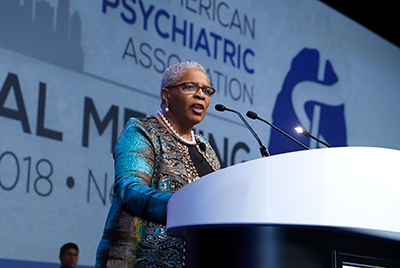Stewart to Focus on APA’s Being a Leader on Issues of Diversity and Inclusion

“We cannot be a leading voice for mental health in isolation.”
That’s what APA President-elect Altha Stewart, M.D., declared in the speech she delivered tonight at the Opening Session at APA’s 2018 Annual Meeting. She pledged to devote her presidential year to expanding APA’s global reach, its mentorship of young trainees and early career psychiatrists, and its involvement in contemporary social issues.
In outlining her three priorities, Stewart began by emphasizing the importance of mentoring young physicians to grow the profession of psychiatry. “I intend to actively engage our resident and fellow members and encourage all of us more ‘seasoned’ members to become mentors, starting at the local level,” she said.
Stewart herself is mentor to a young undergraduate student at Howard University as part of APA’s Black Men in Psychiatry Pipeline Program, designed to increase the number of young black men who are interested in medical careers, specifically psychiatry. “I want to encourage similar innovative outreach efforts to draw men and women from other diverse backgrounds to our profession,” she said. “APA must develop a sustainable strategy for the future that reflects the needs and the voices of our colleagues who are just beginning their careers.”
Excessive student debt is high on the list of critical issues facing young physicians. “How are the burdens of student loans affecting where and how our early career psychiatrists choose to practice?” Stewart asked. “Is APA doing enough to creatively and innovatively help them meet these challenges? Continuing to engage with and listen to the newest members of our profession will be a key part of my year as president—and I hope it will remain central to APA as the leader in determining the future of American psychiatry.”
Global outreach is vital for APA. “Taking a leading role globally will strengthen and reinforce APA’s position as the base for the highest quality, most effective treatment in the United States and give us a stronger voice worldwide,” she said.
But she added that American medicine and psychiatry may have something to learn as well. “Many countries in Africa have only a few practicing psychiatrists,” she said. “What can we learn from how they provide mental health services to their population that will help with our workforce needs in underserved areas? How might those lessons apply to the psychiatric workforce shortage we face here in the United States?”
Stewart recounted a recent trip to Jamaica for the third annual Global Mental Health Conference. “I was struck by the fact that they have reduced the number of psychiatric beds available without seeing an increase in people with mental illness in prisons and jails,” Stewart said. “That is a challenge we struggle with here in the U.S. Different cultural framework and resource allocation systems to be sure, but the critical difference in Jamaica seems to be how they develop and provide community-based services.”
Psychiatry also needs to extend its reach to address social issues and problems associated with racism, sexism, ageism, and fear and distrust of gay people. “We’ve seen how these issues affect everyday lives through Black Lives Matter, the Me Too movement, the recent issues facing transgender Americans serving in our military, and more,” Stewart said. “The evidence is clear that discrimination and many forms of harassment have a lifelong negative effect on mental health for all, but especially people of color, women, gays and lesbians, immigrants, and others.”
In this regard, she said, APA has sometimes fallen short. “We can go all the way back to 1844, when one of the APA’s founders, Dr. Francis Stribling, insisted there be a Committee on Asylums for Colored Persons, which assured segregation of treatment by race,” she said. She also noted that there is no publicly available evidence that APA filed an amicus brief in the Brown v. Board of Education case, despite the urging of prominent APA members like Charles Prudhomme, M.D., the first black psychiatrist elected to APA office. “By declining to engage in this ‘social’ issue, APA missed an opportunity to make a statement about the negative psychological effects of racism, which has now been scientifically proven to be more than a ‘social’ issue,” Stewart said.
In the 1960s, APA continued to grapple with issues of race, she said. “A group of black psychiatrists led by Dr. Chester Pierce came to a meeting of the APA Board of Trustees in May 1969, presenting a list of 10 demands to the organization. The New York Times reported that black psychiatrists demanded that APA acknowledge racism as a mental health problem, deny membership to psychiatrists who practiced racial discrimination, and work to desegregate all public and private mental health facilities in the United States.”
While some demands were not met, she said, the act led to a shift in how APA worked with its diverse membership and opened the door for these members to have a stronger voice and become more visible at APA.
“As your next president, I want to see APA take a leading role on issues of diversity and inclusion in medicine and how discrimination and implicit bias affect the psychological and physical health of not only our patients but our members.”
She concluded with an allusion to the nighttime star by which Harriet Tubman and other slaves navigated in their trek toward freedom. “We will not resolve any of these issues in a year, but maybe we can find our North Star to guide us toward a more inclusive and accepting culture of medicine,” Stewart said.
(Image: David Hathcox)
|
|
|
|
Advertisement
 |
|
 |
|
|



